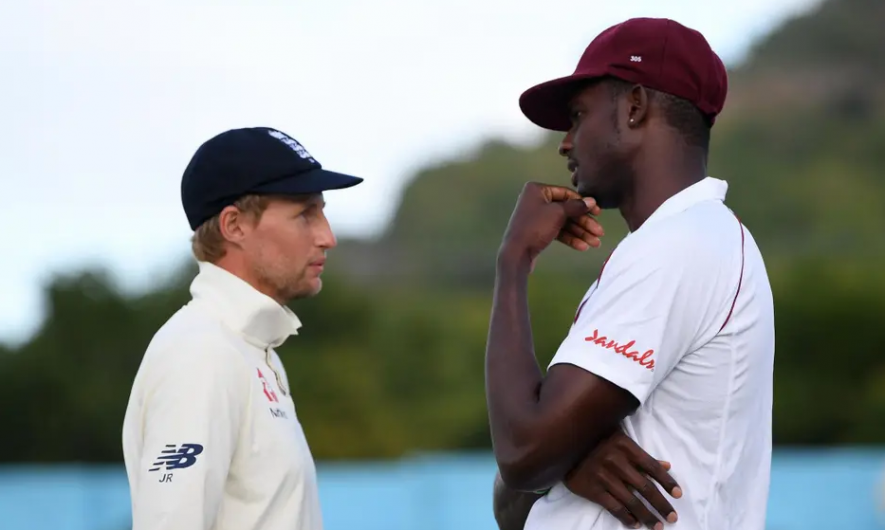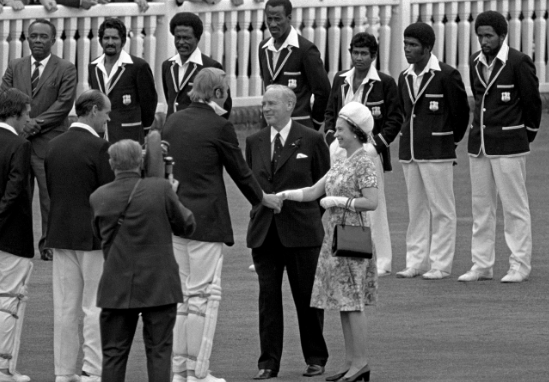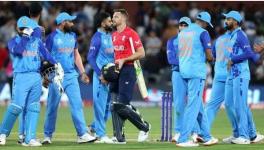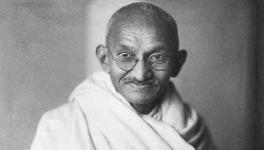Tour de Resilience: West Indies Take a Big Step Forward, Into the Unknown and the Known | Outside Edge

The West Indies, led by Jason Holder (right) have arrived in England. The Test series against Joe Root and Co. will begin on July 8 with the opener at Southampton, followed by two matches at Old Trafford in Manchester (Pic: Twitter, Independent).
History…. We throw the word about a lot in sport, don’t we. It is, inarguably, the most used and abused word in sporting parlance. It is loved by the commentator perched atop a perpetual hyperbolic rollercoaster. It is adapted liberally by the sportswriter in the midst of an adjective-laced exaggeration spree. It is always embraced by a fan looking to add (at times unjustified) gravitas to his or her presence on the stands, or, in front of a screen — the new normal. We, after all, lust for those moments that add meaning to our presence at a given time, in a given place. It could be for something as vain as an Instagram story, or as meaningful as a tale to be narrated 20 years down the road to a grandchild as oral history.
There is no way one could be sure of history till years after when the relevance of that moment becomes pivotal towards a tangible change to the world we live in, or in the sport we follow religiously. History will never be ‘history’ in present tense. We should stop assuming it would be no matter how big a fan we are, no matter how significant the victory or sporting landmark is.
But today I will make an exception, indulge in assumptions, and use the H-word quite liberally. No, the richest cricketing body in the world, the Board of Control for Cricket in India (BCCI), has not decided to stop its self-serving existence and act in the common interest of the game. That would be historic, wouldn’t it? But, not yet.
The inner cubicles of Indian cricket are mulling nationalism as of now — how to jump onto the popular, and impractical bandwagon and distance themselves from its Chinese sponsors, while ensuring the revenue models stay at the same time. Typical, and historic BCCI indeed.
Also Read | East Bengal Faces a New Identity Crisis, Lost In A Web of Its Own Making
As this histrionic dilemma rages on — along with the Board’s power play at the International Cricket Council (ICC) to stage this season of the Indian Premier League (IPL), sponsored by Vivo, at the expense of the T20 World Cup — lesser mortals of cricket are doing what is, in actual, the right thing to do. They are making history.
It is a habit perhaps. Cricketers from the West Indies have left indelible and lasting landmarks in history and not just on record books like some of our heroes turned Gods turned Parliamentarians. The legendary teams from the Caribbean, used, via victories both symbolic and real, the very game of the colonial and racist master to push across ideas of equality, independence, and above all, humanism. They all made history — Frank Worrell, Sir Garfield Sobers, Clive Lloyd, Viv Richards, Michael Holding — not because of the verses written by sports scribes of the day, but by the relevance of their actions. It is this that we see as a legacy to the game as well as humankind decades since. Jason Holder and his men, currently in England, will join that club.
Holder and the West Indies Test team landed in England early last week for their tour, heralding the Covid-19 era onto the cricket field. Marching with them will be the new normals of existence the game has prepped for. The matches will miss the measured applause of the appreciative crowd at cricket’s most historic venues for sure. But the series in itself comes laden with additional context much like the many England-West Indies series of years past.

England vs West Indies historic Test series of 1976 (Pic: FB/Cricket Monthly).
It also comes at a most intriguing moment on the human timeline. A crossroads where a pandemic which has exposed inequalities that — to an extent, sitting atop privileged highrises, we never knew existed — have merged into a global uprising against systemic racism. Smack in the middle, fortuitously, we have a bunch of players — a mix of black and brown with a proud sporting heritage enriched by class and race strife — arrive in England once again. Again the pioneers.
The struggling West Indies Cricket Board (WICB), and its players — enduring a 50 percent pay cut after the coronavirus pandemic crippled finances — may have their own personal reasons to risk health and possibly life to make this cricket tour a reality. But, perhaps by design or inadvertently, they are also party to a cricket series that would keep the game afloat till things settle down, whenever that may be.
Make no mistake. It isn’t as if the England and Wales Cricket Board (ECB) — one of the Big Three in world cricket — is doing a favour to the WICB by hosting them. On the contrary, this tour will save England from an imminent cash crunch. Salvage their summer.
Also Read | The Indian Premier League: A Monster That Threatens To Consume Its Maker, And Cricket Itself
It is poetic justice that the West Indies, rich in history, raw talent, and poor in all other economic parameters of cricket, are the team helping England breathe. Not so long back, England, teaming up with Australia and India, successfully bullied for an ICC revenue model that favoured the Big Three. The game has relegated almost all the rest of the cricket-playing countries (16 or so at last count) into self-reliance or ‘aatmanirbartha’, the favourite word of Indians these days.
The irony doesn’t end there. England next play Pakistan, whose Board is not exactly in the pink of health financially either. It is one which has suffered due to an aggressive non-cooperation stance from the BCCI. And here comes the best part. After Pakistan, England are playing Ireland, a country which they essentially booted out of the World Cup after lobbying for a 10-team, totally elitist tournament. Karma takes many forms. One is that of a canid.
This is perhaps the virus’ gift to the game. A realignment of priorities and recalibration of dynamics. If cricket still harbours global aspirations, a well-rounded development of the game where all the countries that play benefit, is paramount. And tours and bilateral series with so-called minnows is a must. Then again, who the minnows are in these Covid-19 times is up for debate. Everybody is one and time will prove it.
The BCCI, from where it stands at the moment, seems oblivious to the vagaries of time. It is yet to understand the kind of damage it has inflicted or is capable of inflicting by maintaining course and status quo.
Even as the lesser mortals of cricket think large, the BCCI has shrunk to the stature of a neighbourhood bully. The Board, according to reports, recently made plain to the Asian Cricket Council (ACC) that it won’t curtail the IPL window to accommodate the Asia Cup. They have shown least interest in the staging of the ICC World T20 Down Under as well. Apart from what seems like a clear diplomatic gesture — a tour of Australia in December — India has shown no interest in playing any other country. In a moment of crisis that would forever leave a mark on the future of the game, its most powerful body has closed itself up — a lockdown reminiscent of the one unsuccessfully implemented in the country.
Back to England, and some action — call it promise, distraction, solidarity or Tour de Resilience — the West Indies Test series in England begins on July 8 with the opener at Southampton, followed by two matches at Old Trafford in Manchester. The venues were selected taking into account the availability of a hotel in the facility to keep the players cocooned and safe in a sporting containment zone of sorts within the premises. Fans will be missing. There will not be spit on the red cherry.
There will be cricket though with subplots such as Jofra Archer steaming in to bowl against some of his old Under-19 teammates, and last but not the least, an expected unified display of support to the Black Lives Matter movement by both sets of players. History in the making, indeed!
Get the latest reports & analysis with people's perspective on Protests, movements & deep analytical videos, discussions of the current affairs in your Telegram app. Subscribe to NewsClick's Telegram channel & get Real-Time updates on stories, as they get published on our website.
























